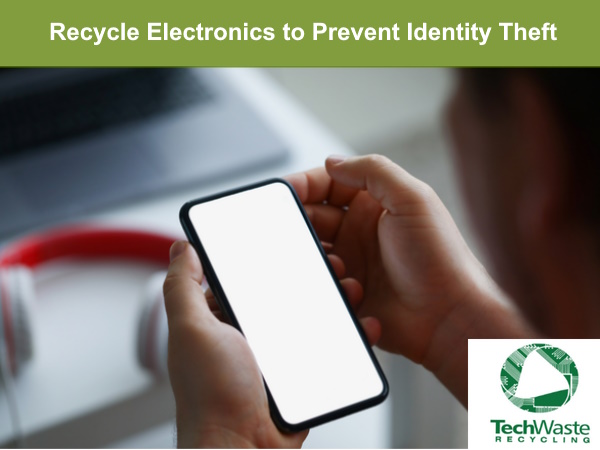Did you know that recycling devices help prevent identity theft? You may contribute to the security of electronics and data by recycling correctly and immediately. Recycling security is a vital component of the recycling process and should not be neglected while searching for the best approach to dispose of your e-waste.
Besides our wallets, the one thing we always have with us is our cell phones. It is remarkable how dependent we are on our smartphones in the present day. This involves checking our email, providing instructions, taking photographs, and making appointments.
Many of us, though, are unaware of how much of our personal lives are stored within our smartphones. Because a large amount of our personal information is saved on such small devices.
How much private information is stored on mobile phones?
It is essential to be mindful of the information stored on electronic devices due to the advanced functionality of modern mobile phones. Your cell phone stores the date each time you search, send and store personal information on a website.
Your personal information remains on the previous device each time you upgrade your cell phone. The same thing happens when you want to recycle, sell, or discard your old phone.
Unfortunately, hackers are becoming increasingly adept at obtaining this information. Therefore, they comb the Internet for listings of secondhand cell phones on online auction sites. After purchasing them for a few bucks, they examine them for personal data. They can locate vast quantities of data. This includes the passwords for your email and online banking accounts.
Most consumers and organizations forget to take precautions in securing their sensitive information before disposing of mobile devices and hard drives. Most people overlook electronic data security. You should pay extra attention to electronic data security.
Even erasing your data may not be sufficient. Your data may still be retained on the devices, making it available to cyber criminals. Existing data on previously-owned mobile devices is frequently sufficient to identify the prior owner. Sadly, too many individuals believe that their mobile data is secure. And they only discover the truth the hard way.
Your mobile phone provides secure data storage, but only while the device is in your possession. Once security data slips into the wrong hands, data security becomes an issue.
This holds true for customers and corporations alike. Today, business security breaches remain a major worry.
Why is this an increasing cause for concern?
Technological advancements are remarkable. Each new generation of your smartphone has additional capabilities. And they expand the capabilities of your smartphone. And it increases how dependent we have become on it.
Consequently, the previous versions are rendered obsolete. Therefore, we replace them.
Some individuals prefer to recycle their old phones, but far too many throw them away, which is detrimental to the environment. The disposal of electrical devices in landfills causes environmental problems. E-waste includes dangerous elements such as arsenic, copper, and lead that can poison the soil and aquifers. California has even prohibited the disposal of e-waste in landfills.
The most prudent course of action is to recycle your old cell phone as e-waste. R2-certified recycling companies can eliminate any potential risk of identity theft.
How does technology affect this circumstance?
While technology is making cell phones increasingly intelligent, not all devices use encrypted storage, so losing the encryption key renders recovery difficult. Some devices rely on the user overwriting their data to delete it.
However, research has shown that it is not always simple to delete data from devices using this manner. Too frequently, data remains after the owner has stopped using it.
A Single Data Breach Can Bankrupt Even the Largest Insurance Company
Identity Theft Prevention Through Recycling Security
Here are precautionary measures to prevent identity theft prior to disposing of, selling, recycling, or donating your gadgets.
Refer to the device’s user guide or online FAQs for factory reset instructions. This is possible with laptops, tablets, cellphones, and wearable technology.
According to the Cybersecurity & Infrastructure Security Agency of the Department of Homeland Security, you might consider utilizing disk-cleaning software, which can destroy your data and then completely wipe your hard drive.
Backup your files. Use a cloud-based service or get an external hard drive. This can help keep sensitive data off local hard drives and make the disposal of outdated equipment easier without the risk of losing your data.
Obtain an identity theft protection plan so you can be notified of any questionable behavior involving your data, whether it involves a discarded electronic device or not.
Your old device can be donated or recycled, rather than discarded. Local governments are increasingly sponsoring e-cycling programs that keep gadgets out of landfills and guarantee that all user data is wiped from devices. Before disposing of your gadgets, including IoT (Internet of things) and medical equipment, conduct an online search for electronic recycling centers in your area.
Lastly, many device makers accept used devices for refurbishment or recycling and might provide consumers with a credit toward the purchase of a new item. Some recycling programs accept devices from any manufacturer. Check with the manufacturer to see if they provide a recycling program that could possibly help you acquire a newer model.
Electronic recycling R2-certified companies, such as TechWaste Recycling, may also handle your e-waste disposal. Call them to schedule a pickup. see areas we serve


































